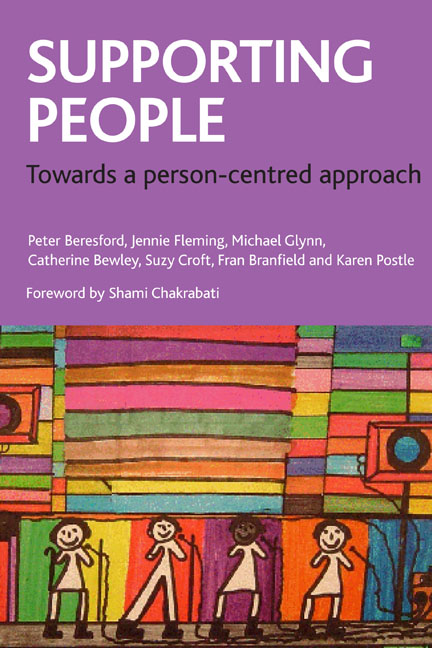Book contents
- Frontmatter
- Dedication
- Contents
- About the authors
- Acknowledgements
- Foreword
- Introduction
- Part One The Background to Person-Centred Support
- Part Two Person-Centred Support: Barriers and Ways of Overcoming Them
- Part Three Broader Issues for Person-Centred Support
- Part Four Making Change to Achieve Person-Centred Support
- Appendices
eleven - Access to the mainstream
Published online by Cambridge University Press: 01 September 2022
- Frontmatter
- Dedication
- Contents
- About the authors
- Acknowledgements
- Foreword
- Introduction
- Part One The Background to Person-Centred Support
- Part Two Person-Centred Support: Barriers and Ways of Overcoming Them
- Part Three Broader Issues for Person-Centred Support
- Part Four Making Change to Achieve Person-Centred Support
- Appendices
Summary
We have our own mindsets and agendas. I will give you a classic example. I went on a visit yesterday to see a person with learning disabilities. [She] was with her partner. They had got gas heating and I said, ‘How can we support you?’ and they mentioned central heating, and I said, ‘I work in social care.’ So when you think of person-centred approaches, it should be in a holistic way, but we work within service areas – and we have to overcome some of those barriers as well … and mindsets …
(Manager)Standard Ten: An holistic approach to people's rights and needs
The achievement of person-centred support based on the philosophy of independent living demands equal access to mainstream life and services, as well as suitable support services, if it is to be consistent with the values of independent living. It requires an holistic approach to people's rights and needs, rather than people still being expected to live their lives confined to care services.
The message of ‘independent living’
In the Standards We Expect project, we worked with a wide range of people who used social care and health services. Historically, as we have seen, there has been a tendency for such services to segregate and isolate those groups which come into contact with them, reinforcing perceptions of them as different and ‘other’. The two key components of the philosophy of ‘independent living’, developed by the disabled people's movement have been concerned with challenging this. The philosophy lays an emphasis on both:
1. Ensuring disabled people the support they needed to live their lives on as equal terms as non-disabled people; and:
2. Ensuring disabled people equal access and participation in mainstream policy, services and life, alongside non-disabled people.
Thus changes in dedicated support services to become more ‘person-centred’ also need to be considered in relation to broader change in mainstream policies and society, if they are to be consistent with the philosophy of independent living. People's need for dedicated support is not a constant, but as we have seen, will also depend on the broader workings of society. So, for example, special transport schemes have traditionally been developed to compensate for the inaccessibility of ‘public transport’.
Information
- Type
- Chapter
- Information
- Supporting PeopleTowards a Person-Centred Approach, pp. 285 - 306Publisher: Bristol University PressPrint publication year: 2011
